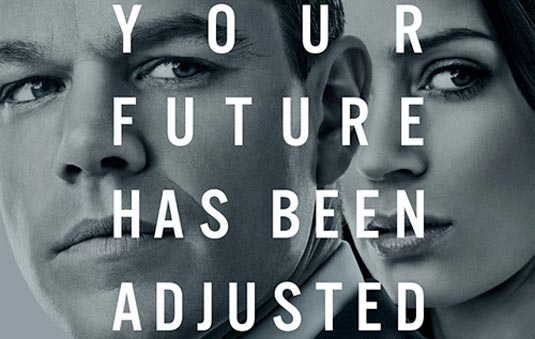All sorts of little things alter our trajectories through life. There's an accident blocking the main road, so you get to Starbucks 10 minutes later, so you don't run into your old girlfriend, so you don't get back together, so you don't get to know her famous lawyer dad, so you don't meet his lawyer pals, so ...
So what? In "The Adjustment Bureau," we are offered a very interesting "what if?" What if some of those little incidents aren't actually accidental, but deliberate adjustments designed to keep our lives going "according to plan"? Many people we see (clue: they're wearing hats) are actually the bureau's agents--angels in the biblical, not the winged cherub, sense, who carry out the plans of The Chairman.
It wasn't always that way. Humans screwed up badly in the first half of the 20th century, so we've been put on a short leash. There's a Book of Life in every angel's hands, tightly prescribing who does what, who marries whom, etc. But--and this is the fun part--the plans are implemented mostly without getting into people's heads. The angels manage to keep us on course mostly by tinkering with seemingly trivial external events.
Of course, there's got to be a romance. Our hero, played by Matt Damon, is not supposed to get together with a delightfully zany woman he meets, by sheer accident, in the men's room. His book of life allows the chance encounter, but no further interaction. The problem is, his guardian angel falls down on the job, calling him a little too late, so he doesn't spill his coffee and doesn't miss his bus. He meets the woman again, which necessitates an intervention by a whole team from the Bureau. Now it's man against angel...
OK, go see the movie. It's a lot of fun. The movie's background theory about free will is intriguing. The theory is that, absent any adjustments, we are free (the issue of causal determinism never rears its head). When our lives are forced into conformity with The Chairman's plans, we are not free. Adjustments compromise free will and accidents don't.
Here's what's a little ticklish about that: whether missing the bus is an adjustment or an accident, it looks and feels all the same. This is a difference that doesn't penetrate the mind/brain. You'd think that having or lacking free will would be "in here"--inside our heads. But no, a free Matt Damon is exactly like an unfree Matt Damon. The difference is "out there," a question of the way his environment works.
You might be tempted to consider an alternative view: both adjustments and accidents compromise free will. Now we don't have to say that Matt Damons who are just alike inside could be free and unfree. They're all the same--unfree.
Alternatively, you could say that adjustments don't compromise free will and accidents don't compromise free will either. That has some appeal. Just because an angel makes Matt Damon miss his bus, foreclosing a certain future, doesn't mean he can't still make choices. He can choose to go to work or go to the movies; to run for the senate or not run for the senate.
In fact, I like the movie's view. It really does seem like the agent-generated adjustments are special. The notion that you have free will is essentially the idea that you are the author of your own life--you're running the show, in some important sense. If your life actually has a second author, operating continually behind the scenes, that does diminish your role. A whole bunch of accidents would give you a different set of materials to work with, but leave your authorship intact. At least--usually. Yes, a really bad series of accidents can narrow your options so much that you are left less free. But on the whole, there is a difference between planned adjustments and unplanned accidents.
I trust there are no angels, there's no Chairman, and there are no Books of Life, but we each have the power to make adjustments for other people. Parents can have long-term plans for their children, and can alter little events along the way, if they seem to be getting off course. Too much adjusting does seem freedom-reducing, in a way that life's naturally occurring accidents are not. So there's a bit of a real world moral of the story, for those who want one.


2 comments:
When I heard about the movie's premise, I immediately jumped to Frankfurt's Black and Jones thought experiment.... Black wants Jones to do XYZ, he manipulates his environment to ensure that he does XYZ, is Jones free? Is Jones responsible for his actions? Frankfurt argues yes he is responsible, even though he couldn't do otherwise. I haven't seen it yet though, but I intend to soon.
I think in the movie we're supposed to believe the manipulations do get in the way of free will. But see it...possibly you will not agree about what makes the movie interesting. What I like is those "adjustments."
Post a Comment